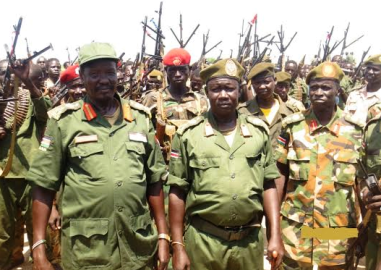South Sudan’s rival forces trade accusations over renewed fighting
March 16, 2015 (JUBA) – Rival forces loyal to South Sudanese president Salva Kiir and former vice president, Riek Machar, have traded accusations over responsibility for initiating and intensifying fresh clashes in different locations in the oil rich Upper Nile state.

“They (armed opposition forces) attacked the positions of our forces yesterday on Sunday but they were repulsed. This took place in border areas of Upper Nile along Sudanese border. The situation is under control of the SPLA forces and they have remained on maximum alert,” Colonel Aguer told reporters on Monday.
He did not however provide details of the clashes, saying he was still waiting for updates from the local command on the ground and would provide once received.
The military spokesperson of the rebel forces, Colonel Lony Ngundeng confirmed the clashes but denied the opposition forces initiated the attack and instead accused the government forces of being on the offensive.
He said their forces in the Shilluk kingdom under the command of Brigadier General Joseph Gai Gatluak only responded to the ongoing offensive by the government since last week which resulted to the capture of Wedakona town from the rebel troops.
He said they however repulsed the offensive after recapturing areas of Masegbel and Gabat from the government troops on Sunday, adding they were pursuing government forces and their foreign allies into Wedakona town.
Ngundeng further claimed that the rebel troops also captured three tanks and other heavy weaponry including one B10, one RPG and other munitions.
He added their forces also inflicted heavy losses on the government as they destroyed a ship carrying heavy artilleries and a whole crew of soldiers in a tank drowned into the River Nile.
The rebels also claimed capturing two army officers from the government, both of whom are from the Nuer ethnic group, further accusing the government of prosecuting a tribal policy of using the Nuer against the Nuer saying majority of government troops in Upper Nile region are from the Nuer.
FIGHTING INTENSIFIES
Meanwhile, the rebels further accused the government of intensifying its dry season offensive in eastern part of Upper Nile state near the oilfields.
The rebel commander of the forces around the Paloij oilfields, Brigadier General Khor Chuol Giet said fresh fighting occurred on Monday morning in Mangok area between the pro-government forces and the opposition, but said they managed to repulse the attacks.
Ngundeng said government forces came out from their positions in Guelguk and attacked anti-government forces in their positions, saying Juba’s dry season offensive aimed at regaining control of Longechuk and Maiwut counties which are under the control of the rebels.
He said fighting was still going on throughout the day.
Colonel Ngundeng accused the government of destabilizing the peace process and lacking commitment on the cessation of hostilities agreement signed in Addis Ababa in January last year.
The renewed fighting came a week after the collapse of direct negotiations between president Salva Kiir and his former deputy and main rival, Riek Machar, who leads the opposition faction of the Sudan Peoples’ Liberation Movement (SPLM-IO).
The East African regional bloc of the Intergovernmental Authority on Development (IGAD) which mediates the peace talks said negotiations between the parties will resume in April after completion of consultations to expand membership of the mediation beyond the continent.
(ST)
